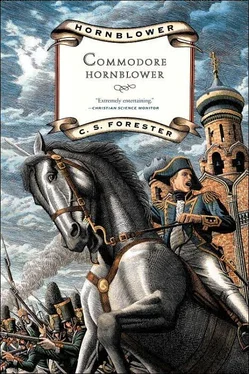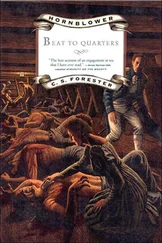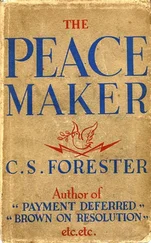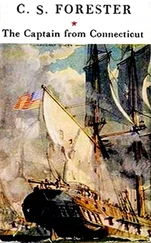They turned to follow him—no one could have resisted the inspiration of his example and gestures. Column and line were still exchanging ragged volleys, the column still moving forward little by little, the line wavering and falling back.
“Form line!” yelled Hornblower, turning in his saddle, his spread arms and gesticulating fists telling the Russians what he wanted them to do. “Load your muskets!”
They formed their line, marching up after him, hands busy with their ramrods—a couple of hundred men at most, jostling each other as they stumbled over the ruins of the cottages. Now they were right on the flank of the column; Hornblower saw faces turn towards them. He was even near enough to see surprise and dismay in the attitudes of the men who suddenly realized that a new force was about to assail their flank.
“Fire!” yelled Hornblower, and some sort of volley crashed out from the ragged line he led.
He saw two ramrods sail forward in soaring arcs, fired out of their muskets by excited men who had been caught in the act of loading by his order, and who had incontinently put their weapons to their shoulders and pulled their triggers. One ramrod buried itself like an arrow in the body of a French soldier. The column wavered and staggered—not one man in a hundred there had expected this attack on the flank; all their attention had been taken up by Essen’s line in front of them.
“Charge!” yelled Hornblower, waving his sword and urging his horse forward.
The Russians followed him with a cheer; the whole column of the enemy, Hornblower saw, was wavering and melting away, the disordered ranks crumbling. They were turning their backs, and the memory streaked through his excited mind of a saying he had heard somewhere to the effect that the knapsacks of the enemy were the most cheering sight a soldier could behold. Then he saw one of the enemy swing back again and level his musket at him. As the smoke gushed from the barrel his horse gave a convulsive leap and then put his nose to the ground and somersaulted; for a moment Hornblower felt himself flying through the air; he was too excited and exalted to feel any fear, so that the crash with which he hit the earth came as a startling surprise to him. But even though the breath was dashed from his body and the jar shook every bone in it, his fantastic mind still thought clearly, and he heard and felt the flank attack which he had led sweep cheering over him. Only when he rose to his feet did he come to the sudden realization that he was bruised and weak, so that it was hard to balance on his legs—they nearly gave way under him as he hobbled forward to pick up his sword which lay shining on the dusty earth between two dead men.
He felt suddenly alone, but the feeling had hardly time to take hold of him when he was engulfed in a wave of humanity, Essen and his staff roaring with exaltation and delight. He stood there, bruised and torn, his sword dangling from his hand, as they overwhelmed him with incomprehensible congratulations. One of the officers leaped down from his horse, and Hornblower was hauled and pushed up into the saddle, and they cantered forward, the horses picking their way delicately over the dead and wounded, over the tortured ground, towards the ramparts. The last remnants of the assaulting forces were being driven back through the breach to the accompaniment of a straggling musketry fire. As they neared the fortifications the guns of the foiled besiegers re-opened fire, and a shot or two came howling overhead, Essen reined up, like a sensible man, and then walked his horse out of the line of fire.
“That was a moment to remember,” he said, looking round at the area where the clash had occurred.
Hornblower’s head was still clear. He realized what a bitter blow this reverse must be to the besiegers. After all the fierce preliminary fighting they had sapped up to the ramparts, made their breach, and launched the assault which should have captured the place, only to be flung back when the breach was in their hands. He knew that Macdonald would have the greatest difficulty in inducing his men to assault again—a bloody failure like this would make them sulky and grudging of their lives. Certainly Macdonald would have to allow a considerable time to elapse, and would have to continue his battering for several more days, and multiply his approaches and parallels, before he could risk another assault. Maybe the town would hold. Maybe that attack would be the last. Hornblower felt prophetic, inspired. He remembered how he had heard the news of Massena’s retreat from before Lisbon—that had been the first of the ebb of the Empire in the South, and now Wellington was in Madrid and threatening France. Maybe Riga would mark the limits of the Empire in the North. Maybe that penetration through the breach would be remembered as the farthest north Bonaparte’s men would ever attain. At that rate—Hornblower’s pulse beat quicker—the flank attack he had led, that unforeseen charge of a couple of hundred men hurriedly gathered up in the tumult, had been the blow which had thwarted Bonaparte’s schemes to conquer the world. That was what he had done. And it would look extraordinarily well in The Times that ‘Commodore Sir Horatio Hornblower, K.B., had his horse killed under him while leading a charge.’ Barbara would be pleased.
Exultation and inspiration ended abruptly, and Hornblower felt suddenly weak and ill. He knew that if he did not dismount quickly he would fall from his saddle. He took hold of the pommel and kicked his right foot clear of the stirrup, swung his leg over, and then as his feet touched ground the ground came up to meet him. He only recovered some indefinite number of minutes later, to find himself seated on the ground, his stock unbuckled, and his face clammy with cold sweat. Essen was bending anxiously over him, and someone, apparently a surgeon, was kneeling at his side. His sleeve was oiled up above the elbow, and the surgeon, lancet in hand, as about to open a vein to bleed him. Hornblower withdrew is arm abruptly, for he did not want to be touched by that thing, nor by those hands which were black with other men’s blood.
The assembled staff raised their voices in protest, but Hornblower disregarded them with the sublime abstraction of a sick man. Then Brown appeared, cutlass at his side and pistols in his belt, followed by other members of the barge’s crew. Apparently he had seen his captain ride over the bridge, and, like the good subordinate he was, had brought the boat across after him. Brown’s face was contorted with anxiety, and he threw himself, too, on his knees beside Hornblower.
“Wounded, sir? Where is it? Can I—”
“No, no, no,” said Hornblower pettishly, pushing Brown away and getting to his feet, swaying. “It’s nothing.”
It was extraordinarily maddening to see a look of admiration come over Brown’s face. Anyone would think he was being heroic instead of merely sensible. Not far away—at the foot of the breach, apparently—a trumpet was pealing, high challenging notes, and this served to distract the crowd from their solicitude. Everyone looked in the direction of the sound, and presently a group of Russian officers approached them, leading a blindfold figure dressed in the blue trimmed with grey astrakhan of the French Imperial Staff. A word from Essen removed the bandage, and the officer—he wore a grey Hussar moustache—saluted with dignity.
“The chef d’escadron Verrier,” he said, “aide-de-camp to Marshal the Duke of Tarentum. I am ordered by the Marshal to suggest a suspension of hostilities for two hours. The breach is covered with the wounded of both sides, and it would be only humane to remove them. Each side can remove its own.”
“There are more French and German wounded than Russian, I am sure,” said Essen, in his horrible French.
Читать дальше












